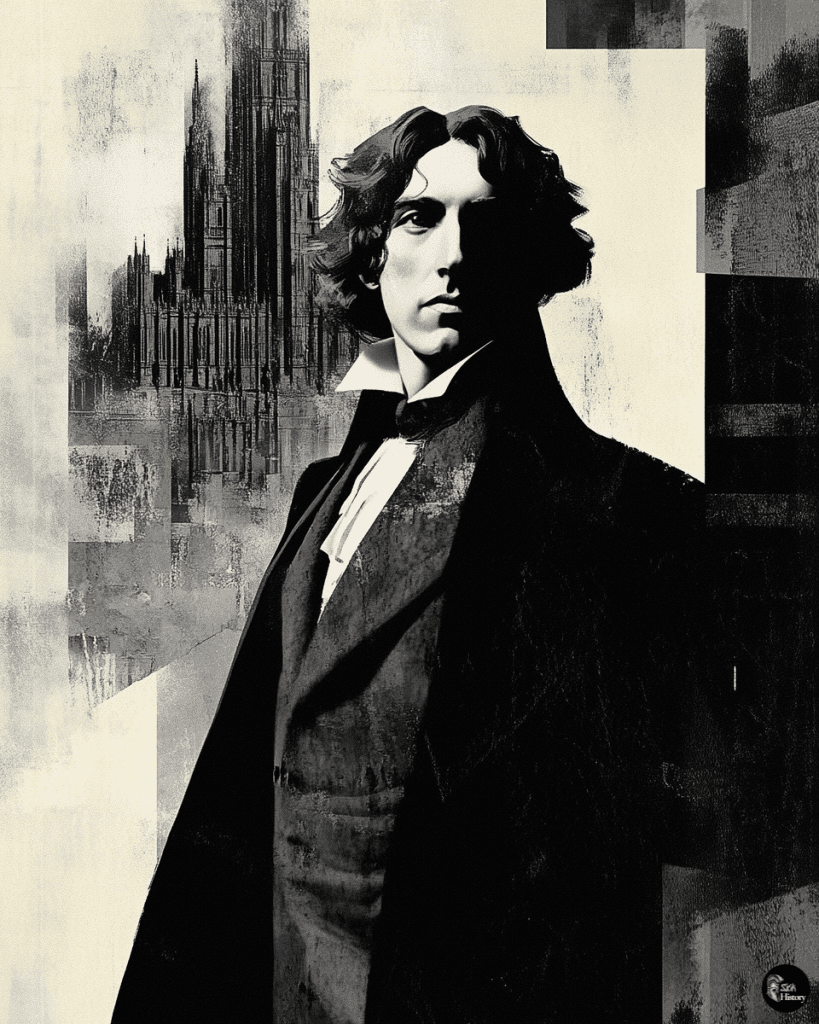Oscar Wilde, the renowned Irish playwright and wit, faced a series of trials in 1895 that would forever change his life and legacy.
The legal proceedings began when Wilde sued the Marquess of Queensberry for libel after the latter accused him of “posing as a sodomite.” This bold move backfired spectacularly, leading to Wilde’s own arrest and prosecution for gross indecency.
The trial of Oscar Wilde became a sensation, captivating Victorian society with its scandalous revelations about homosexual relationships and challenging societal norms.
The courtroom drama unfolded in three parts: the initial libel case, followed by two criminal trials.
Wilde’s relationship with Lord Alfred Douglas, the Marquess’s son, was at the heart of the controversy, which had sparked the accusations.
The proceedings took place at the Old Bailey, London’s central criminal court.
Wilde’s eloquence and wit were on full display, particularly when he spoke of “the love that dare not speak its name.”
Despite his impassioned defense, the jury in the final trial reached a guilty verdict.
The consequences were severe, resulting in Wilde’s imprisonment and eventual exile, marking a tragic end to the career of one of literature’s most brilliant minds.
Oscar Wilde: Life and Legacy
Oscar Wilde’s life and legacy encompass his remarkable literary contributions and his profound influence on Victorian society.
His wit, artistry, and personal experiences shaped both his works and the cultural landscape of his time.
Literary Contributions
Oscar Wilde’s literary genius manifested in various forms, from plays to poetry.
His most famous work, “The Picture of Dorian Gray,” explored themes of hedonism and morality.
Wilde’s comedic plays, including “The Importance of Being Earnest,” showcased his sharp wit and satirical observations of Victorian society.
His writing style blended aestheticism with social commentary, challenging conventional norms.
Wilde’s essays, such as “The Soul of Man Under Socialism,” demonstrated his intellectual depth and progressive ideas.
His fairy tales, like “The Happy Prince,” revealed a softer side, combining beauty with poignant critiques of social injustice.
Influence in Victorian Society
Oscar Wilde’s impact on Victorian society extended beyond his literary works.
As a flamboyant public figure, he challenged social norms and gender expectations. His advocacy for the aesthetic movement promoted the idea of “art for art’s sake,” influencing fashion and interior design.
Wilde’s trials for “gross indecency” in 1895 brought homosexuality into public discourse, albeit tragically.
His imprisonment and subsequent exile highlighted the era’s rigid moral standards and legal persecution of LGBTQ+ individuals.
Wilde’s legacy endured despite his downfall, inspiring future generations of artists and activists.
His witty aphorisms and quotations continue to resonate, reflecting timeless truths about human nature and society.
Wilde’s life and work remain subjects of study and admiration. They symbolize the struggle between individuality and societal expectations.
The Trials of Oscar Wilde
In 1895, Oscar Wilde faced a series of legal battles that would ultimately lead to his downfall. These trials exposed his personal life to public scrutiny and resulted in his imprisonment for gross indecency.
The Marquess of Queensberry’s Accusation
The events leading to Wilde’s trials began with a confrontation from John Douglas, the Marquess of Queensberry.
Douglas, father of Wilde’s lover Lord Alfred Douglas, left a calling card at Wilde’s club accusing him of being a “posing sodomite.”
This public accusation deeply troubled Wilde, who had been in a relationship with Lord Alfred Douglas for several years.
The playwright felt compelled to defend his honor and reputation against the Marquess’s allegations.
Wilde’s friends advised him to ignore the accusation, but he chose to pursue legal action.
This decision would prove to be a critical turning point in his life and career.
The Libel Case Against John Douglas
Encouraged by Lord Alfred Douglas, Wilde initiated a libel case against the Marquess of Queensberry.
The trial began on April 3, 1895, at London’s Old Bailey courthouse.
Wilde’s wit and charm initially seemed to sway the court in his favor. However, the Marquess’s legal team, led by Edward Carson, mounted a strong defense.
They presented evidence of Wilde’s relationships with young men and his homoerotic writings.
As the trial progressed, it became clear that Wilde’s case was weakening. His own testimony began to undermine his position.
Realizing the dire situation, Wilde’s lawyers advised him to drop the case.
On April 5, 1895, Wilde withdrew his libel suit. This decision left him vulnerable to criminal charges for gross indecency.
Trials for Gross Indecency
Following the collapse of the libel case, Wilde was arrested and charged with gross indecency.
His first criminal trial began on April 26, 1895, and ended in a hung jury.
A second trial commenced on May 20, 1895.
The prosecution presented damning evidence, including testimonies from male prostitutes and love letters between Wilde and Lord Alfred Douglas.
On May 25, 1895, the jury reached a verdict.
Wilde was found guilty on all counts of gross indecency. The judge sentenced him to two years of hard labor, the maximum penalty allowed.
This verdict marked the end of Wilde’s illustrious career and his fall from grace in Victorian society. The trials not only ruined Wilde personally but also had a profound impact on literary and social history.
Legal Proceedings and Public Scandal
Oscar Wilde’s trials in 1895 captivated Victorian society, exposing the hidden world of homosexual relationships and challenging societal norms.
The legal proceedings unfolded in a series of dramatic courtroom battles that would ultimately lead to Wilde’s downfall and imprisonment.
The Old Bailey and British Jurisprudence
The Old Bailey, London’s Central Criminal Court, became the stage for Wilde’s dramatic legal battle.
The trial for “gross indecency” began on April 26, 1895, following Wilde’s failed libel suit against the Marquess of Queensberry.
British law at the time criminalized homosexual acts under the Labouchere Amendment of 1885. This legislation made “gross indecency” between men a criminal offense, regardless of whether the acts were public or private.
The prosecution presented evidence of Wilde’s relationships with young men, including letters and testimony from hotel staff.
Wilde’s eloquent defense and witty responses initially seemed to sway public opinion in his favor.
The Role of Lord Alfred Douglas
Lord Alfred “Bosie” Douglas, Wilde’s young lover, played a pivotal role in the events leading to the trials.
Their relationship had sparked the initial conflict with Douglas’s father, the Marquess of Queensberry.
Douglas encouraged Wilde to pursue the ill-fated libel case against his father. This decision ultimately backfired, exposing evidence that led to Wilde’s own prosecution.
During the trials, Douglas was conspicuously absent. He had fled to France, leaving Wilde to face the legal consequences of their relationship alone.
This abandonment deeply affected Wilde, who had risked everything for their love.
The Verdicts and Their Aftermath
The first criminal trial ended in a hung jury, unable to reach a verdict. However, the second trial resulted in Wilde’s conviction on May 25, 1895.
Wilde was sentenced to two years of hard labor, the maximum penalty for gross indecency.
The verdict shocked the literary world and devastated Wilde personally and professionally.
The aftermath of the trials was severe.
Wilde’s works were blacklisted, his name became synonymous with scandal, and he was forced into exile upon release from prison.
The legal proceedings not only ruined Wilde’s life but also had a lasting impact on societal attitudes towards homosexuality.
Cultural Impact and Historical Significance
Oscar Wilde’s trials left an indelible mark on British society, sparking debates about morality, sexuality, and artistic freedom. The proceedings exposed deep-seated prejudices and challenged Victorian social norms.
The Notion of the Love That Dare Not Speak Its Name
The phrase “the love that dare not speak its name” became synonymous with homosexuality following Wilde’s trials.
It originated from a poem by Lord Alfred Douglas, Wilde’s lover.
During the trial for gross indecency, Wilde eloquently defended this love, describing it as a deep spiritual affection between an older and younger man.
His impassioned speech resonated beyond the courtroom, becoming a rallying cry for LGBTQ+ rights movements in later decades.
The trials brought homosexuality into public discourse, albeit in a negative light initially.
Literature and Morality Debates in the Late 19th Century
Wilde’s case ignited fierce debates about the relationship between art and morality.
His works, particularly “The Picture of Dorian Gray,” were scrutinized for their supposed immoral content.
The trials highlighted the tension between artistic expression and societal norms.
Many Victorian-era critics argued that literature should uphold moral values, while others defended the autonomy of art.
This conflict shaped discussions about censorship and the role of literature in society. It influenced subsequent generations of writers and thinkers, encouraging more open exploration of controversial themes in literature.
Reflections on Justice and Society
The trial of Oscar Wilde illuminates complex societal attitudes and legal practices of Victorian England. It raises questions about the nature of justice, moral judgments, and the evolution of social norms over time.
Reevaluating the Wilde Trials Today
Modern perspectives on the Wilde trials often view them as unjust persecutions.
The criminalization of homosexuality, central to Wilde’s conviction for “gross indecency,” is now widely recognized as discriminatory.
Legal scholars analyze the trials’ procedural fairness. The joinder of misdemeanor and felony charges in the first trial has been questioned for its legal propriety.
Social attitudes have shifted dramatically since 1895.
Wilde’s famous declaration of “the love that dare not speak its name” now resonates as a poignant critique of societal repression.
Preserving Historical Memory
The Wilde trials serve as a crucial historical touchstone. They offer insights into Victorian morality, legal practices, and attitudes towards sexuality.
Efforts to preserve trial records, personal correspondence, and contemporary accounts help maintain this chapter of history.
Museums and archives play a vital role in safeguarding artifacts related to Wilde and his trials.
Educational initiatives use Wilde’s story to explore themes of prejudice, artistic freedom, and social change.
His trials feature in literature courses, legal studies, and LGBTQ+ history curricula.
Digital preservation projects ensure wider access to primary sources, allowing new generations to engage with this pivotal moment in cultural history.

